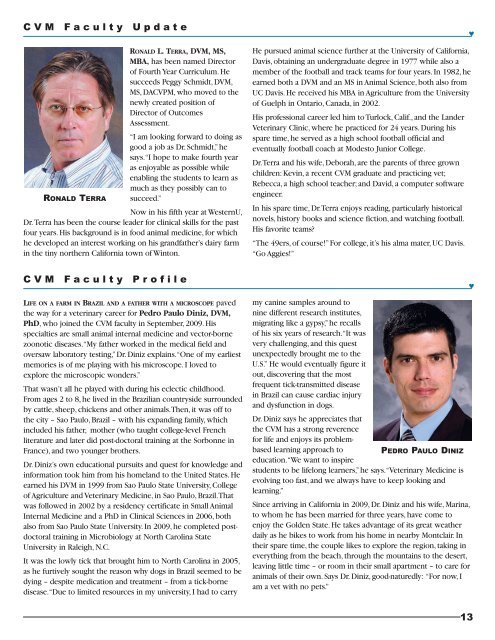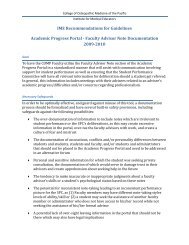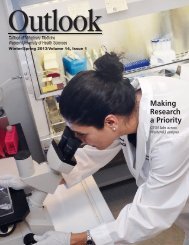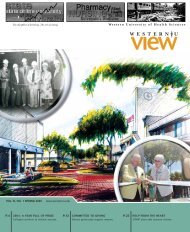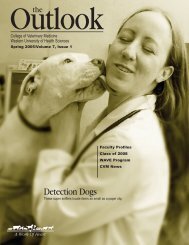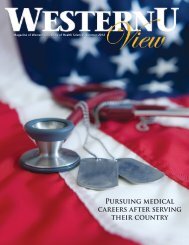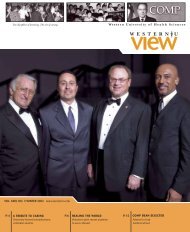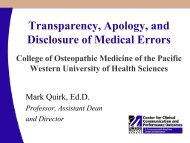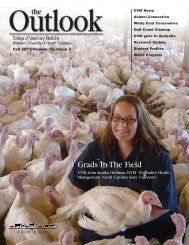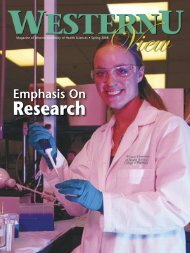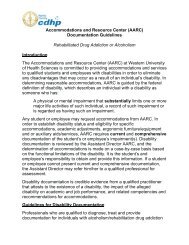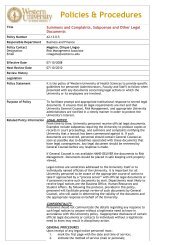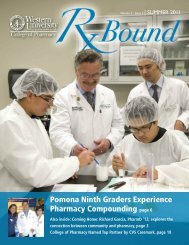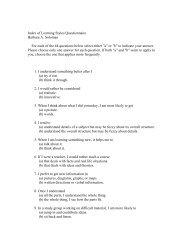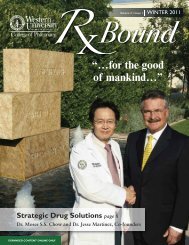Preceptor Profile - Western University of Health Sciences
Preceptor Profile - Western University of Health Sciences
Preceptor Profile - Western University of Health Sciences
- No tags were found...
You also want an ePaper? Increase the reach of your titles
YUMPU automatically turns print PDFs into web optimized ePapers that Google loves.
C V M F a c u l t y U p d a t eRONALD L. TERRA, DVM, MS,MBA, has been named Director<strong>of</strong> Fourth Year Curriculum. Hesucceeds Peggy Schmidt, DVM,MS, DACVPM, who moved to thenewly created position <strong>of</strong>Director <strong>of</strong> OutcomesAssessment.“I am looking forward to doing asgood a job as Dr. Schmidt,” hesays. “I hope to make fourth yearas enjoyable as possible whileenabling the students to learn asmuch as they possibly can toRONALD TERRA succeed.”Now in his fifth year at <strong>Western</strong>U,Dr. Terra has been the course leader for clinical skills for the pastfour years. His background is in food animal medicine, for whichhe developed an interest working on his grandfather’s dairy farmin the tiny northern California town <strong>of</strong> Winton.He pursued animal science further at the <strong>University</strong> <strong>of</strong> California,Davis, obtaining an undergraduate degree in 1977 while also amember <strong>of</strong> the football and track teams for four years. In 1982, heearned both a DVM and an MS in Animal Science, both also fromUC Davis. He received his MBA in Agriculture from the <strong>University</strong><strong>of</strong> Guelph in Ontario, Canada, in 2002.His pr<strong>of</strong>essional career led him to Turlock, Calif., and the LanderVeterinary Clinic, where he practiced for 24 years. During hisspare time, he served as a high school football <strong>of</strong>ficial andeventually football coach at Modesto Junior College.Dr. Terra and his wife, Deborah, are the parents <strong>of</strong> three grownchildren: Kevin, a recent CVM graduate and practicing vet;Rebecca, a high school teacher; and David, a computer s<strong>of</strong>twareengineer.In his spare time, Dr. Terra enjoys reading, particularly historicalnovels, history books and science fiction, and watching football.His favorite teams?“The 49ers, <strong>of</strong> course!” For college, it’s his alma mater, UC Davis.“Go Aggies!”♥C V M F a c u l t y P r o f i l eLIFE ON A FARM IN BRAZIL AND A FATHER WITH A MICROSCOPE pavedthe way for a veterinary career for Pedro Paulo Diniz, DVM,PhD, who joined the CVM faculty in September, 2009. Hisspecialties are small animal internal medicine and vector-bornezoonotic diseases. “My father worked in the medical field andoversaw laboratory testing,” Dr. Diniz explains. “One <strong>of</strong> my earliestmemories is <strong>of</strong> me playing with his microscope. I loved toexplore the microscopic wonders.”That wasn’t all he played with during his eclectic childhood.From ages 2 to 8, he lived in the Brazilian countryside surroundedby cattle, sheep, chickens and other animals. Then, it was <strong>of</strong>f tothe city – Sao Paulo, Brazil – with his expanding family, whichincluded his father, mother (who taught college-level Frenchliterature and later did post-doctoral training at the Sorbonne inFrance), and two younger brothers.Dr. Diniz’s own educational pursuits and quest for knowledge andinformation took him from his homeland to the United States. Heearned his DVM in 1999 from Sao Paulo State <strong>University</strong>, College<strong>of</strong> Agriculture and Veterinary Medicine, in Sao Paulo, Brazil. Thatwas followed in 2002 by a residency certificate in Small AnimalInternal Medicine and a PhD in Clinical <strong>Sciences</strong> in 2006, bothalso from Sao Paulo State <strong>University</strong>. In 2009, he completed postdoctoraltraining in Microbiology at North Carolina State<strong>University</strong> in Raleigh, N.C.It was the lowly tick that brought him to North Carolina in 2005,as he furtively sought the reason why dogs in Brazil seemed to bedying – despite medication and treatment – from a tick-bornedisease. “Due to limited resources in my university, I had to carrymy canine samples around tonine different research institutes,migrating like a gypsy,” he recalls<strong>of</strong> his six years <strong>of</strong> research. “It wasvery challenging, and this questunexpectedly brought me to theU.S.” He would eventually figure itout, discovering that the mostfrequent tick-transmitted diseasein Brazil can cause cardiac injuryand dysfunction in dogs.Dr. Diniz says he appreciates thatthe CVM has a strong reverencefor life and enjoys its problembasedlearning approach to PEDRO PAULO DINIzeducation. “We want to inspirestudents to be lifelong learners,” he says. “Veterinary Medicine isevolving too fast, and we always have to keep looking andlearning.”Since arriving in California in 2009, Dr. Diniz and his wife, Marina,to whom he has been married for three years, have come toenjoy the Golden State. He takes advantage <strong>of</strong> its great weatherdaily as he bikes to work from his home in nearby Montclair. Intheir spare time, the couple likes to explore the region, taking ineverything from the beach, through the mountains to the desert,leaving little time – or room in their small apartment – to care foranimals <strong>of</strong> their own. Says Dr. Diniz, good-naturedly: “For now, Iam a vet with no pets.”♥13


